When a business created from nothing in 2011 rapidly becomes one of the biggest investment funds in European football, representing stars such as David Beckham and Neymar, there are naturally questions asked. But when journalists ask the London HQ of Doyen Sports Investments who the owners are they are told the information is confidential
In June 2013, the Bloomberg agency appeared to partly lift the veil when it reported that Doyen sports belongs to two businessmen, one of whom it said was Tevfik Arif, a Kazakh-Turkish property tycoon.
The report was inaccurate. Doyen Sports is in fact controlled by a younger brother of Tevfik Arif. But Bloomberg’s disclosure of the family name was enough to cause panic amid the clan. Arif Efendi Arif, the son of Tevfik Arif, is the boss of the London-based operations of Doyen Sports. He wrote to his director of the business, Nelio Lucas, warning that if the name of his father were to be repeated in the press “Kazakhs […] will go after our family business in Kazakhstan and then it's all over […] we will be left with nothing”.
Lucas, a Portuguese, replied that he doubted such an idea, to which Arif retorted that Lucas had always lived in the “civilized” world, as opposed to Kazakhstan or Turkey. “They will ruin us,” insisted Arif Arif. “They will expose us, our business and our high level relationships, then it’s all over.” The danger was such, he said, that the family was envisaging the immediate liquidation of Doyen Sports.
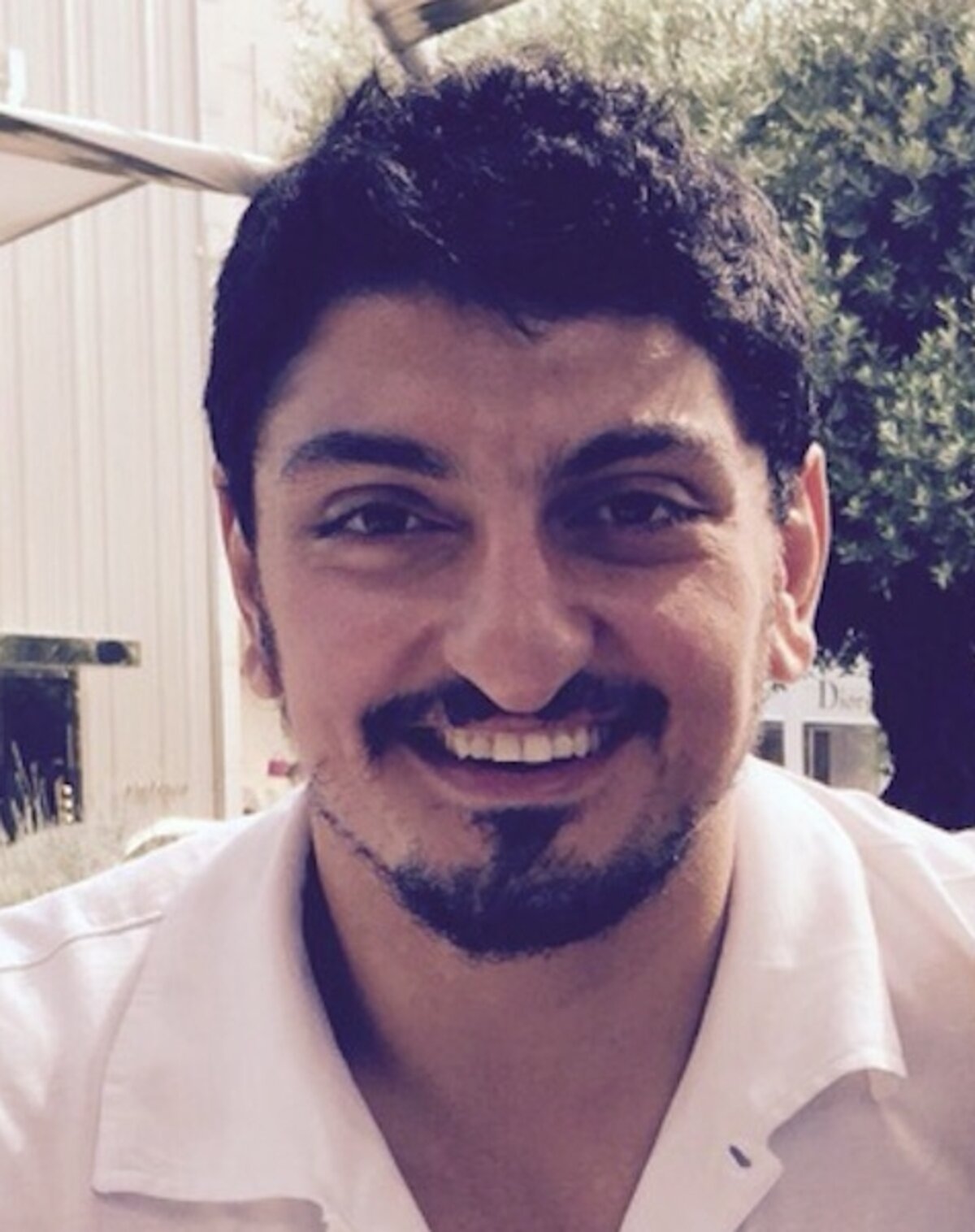
Enlargement : Illustration 1

Documents in the possession of Football Leaks, obtained by German weekly magazine Der Spiegel and analysed by its partners in the journalistic consortium European Investigative Collaborations (EIC), and who include Mediapart, show that the family business centred on a Kazakh chemical plant, from which the Arifs siphoned off more than 300 million euros. They were placed in tax havens - with the aid of others apparently so powerful that they could ruin the Arif family if they became so inclined. It is this money that was in part used to finance Doyen Sports, to the sum of 75 million euros. The funding was apparently of a nature so nefarious that the simple disclosure of the identity of the Arifs was intolerable for the family’s partners.
The Football Leaks revelations have included the dark methods employed by Doyen Sports, including organising prostitutes to attend a party for the president of Spanish club Real Madrid (see here) and secret commissions paid via Dubai to influence club transfers of footballers (see more here). Our revelations about the owners of Doyen Sports show that the football business has allowed itself to be infiltrated by the dubious funds of a clan of oligarchs with mafia-like connections, and which applied to football the same methods behind its other business successes, success, notably prostitutes, tax havens and influence peddling at the highest levels.
It was how the Arif family built a secret empire dealing in raw materials, chemicals, the hotel trade, the construction industry - and now football - and which stretches from Brazil to Turkey and the Steppes of Central Asia.
Doyen Sports belongs to four Kazakh brothers who have adopted Turkish nationality. Little is known about three of them, Refik Arif, Rustem Arif and Vakif Arif, who manage the group out of Istanbul. Rustem Arif, 67, appears to be the chief of the clan, and oversees the chemical plant in Kazakhstan from his base in Istanbul. In an email seen by the EIC, Arif Efendi Arif wrote that his uncle Rustem was the head of the family, explaining that in Kazakh culture the patriarch is usually the eldest in the family.
The fourth brother, Tefvik Arif, 63, is the only one to have a public profile. He was suspected of running a network importing underage prostitutes into Turkey, and has been active in the property market in the US in association with a former stockbroker convicted for assault and implicated in a major fraud on the New York stock exchange involving Mafia families. Tevfik Arif came to media attention after he went into a property development partnership with president-elect Donald Trump (see our report on their association here).
Tevfik Arif now lives in London, and has wide network of contacts. When Sarah Ferguson, Duchess of York, was charged in Turkey in 2012 for covertly filming a state-run orphanage, it was Tevfik Arif’s son, Arif Efendi Arif, who was given the task of transmitting her letter of apologies to then-prime minister Recep Erdoğan, now president of Turkey, and a friend of the Arif family.
The Arifs are also close to billionaires Alexander Mashkevitch, Alijan Ibragimov and Patokh Chodiev, who are together nicknamed “the Trio” and who own the biggest mining group in Kazakhstan, Eurasian Resources Group. They have been implicated several times in corruption probes, for their roles as intermediaries for major multinationals, including Airbus, and notably the “Kazakhgate” scandal – in which former French president Nicolas Sarkozy and members of his close entourage have also been cited (see more here).
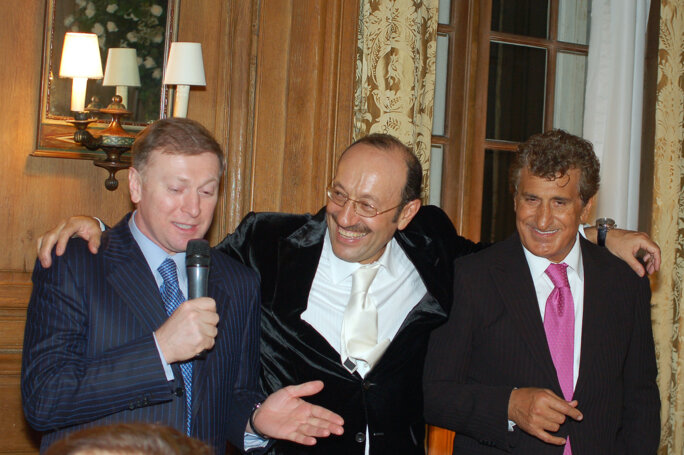
Enlargement : Illustration 2

The “Trio” were invited to celebrate the marriage of Arif Arif at a party held on September 19th 2015 in the Arif family’s luxurious family property in Antibes, on the French Riviera. Among the 115 guests in the gardens of the property, which has a swimming pool and four villas, was the Kazakh foreign affairs minister, an Angolan general, several oligarchs from the former Soviet Union (including the head of Russian oil giant Lukoil), and a Russian Member of Parliament close to President Vladimir Putin.
The Arifs also enjoy relations with Arik Kislin, a businessman who allegedly ran an offshore fund tied to the Russian mob. The Arifs’ also invest in the African mining business of Samuel Jonah, a key figure in the Uramin scandal which ruined French nuclear construction group Areva.
The Arif family clan went to considerable lengths to remain discreet, to ensure that this network of relationships, like the very existence of the family business, should never come to light. Their wealth is held in a chain of offshore companies and trusts using frontmen, scattered in Panama, the Isle of Man, the Netherlands, Malta and the British Virgin Islands. These shell structures manage commercial companies and the private wealth of the family, including their 21-million-euro London property and two private jets. The planes are placed at the disposition of Doyen Sports director Nelio Lucas for his business dealings, when he wants to impress football club presidents.
Contacted by the EIC, members of the Arif family did not respond to our attempts to interview them.
Contacted by Der Spiegel magazine on behalf of the EIC, Nelio Lucas declined to answer our questions. Instead, the EIC was contacted by Harbottle & Lewis, the London law firm that represents the interests of Doyen Sports, which said its clients took issue with all of the matters raised by the EIC. The legal practice warned that its clients would consider taking legal action if we were to publish the information in question. Harbottle & Lewis said this was obtained through an illegal cyber attack followed by a blackmail attempt which was being investigated in Spain and Portugal.
The documents from Football Leaks, obtained and analysed by the EIC, illustrate how the Arif clan are keen to hide the origin of their fortune, which was a chemical plant in Kazakstan. The brothers became owners of the plant in the middle of the 1990s, just a few years after the December 1991 dissolution of the Soviet Union, when Russia’s new president, Boris Yeltsin, described his country as the “biggest mafia state in the world”. It was a dark period, when future oligarchs bought up factories and mines at bargain basement prices, helped by corrupt politicians and organised crime.
Two of the Arif brothers were ideally placed to take advantage of Kazakhstan’s vast mining resources. After the fall of the Berlin Wall in 1989, which set in train the crumbling of the Soviet Union, Tefvik Arif left his job as a civil servant with the Ministry of Commerce and Trade to start a business in trading and transforming raw materials. His younger brother Refik held a key position in the Ministry of Industry, responsible for assisting potential foreign investors in the metal industry.
In the early 1990s, Tevfik Arif became the local agent for brothers David and Simon Reuben, Indian-born British businessmen who made a fortune in the metals trade and who bought up the majority of the Russian and Kazakh aluminium business. But subsequently, the Reubens were to lose control of much of their assets, caught up in what a report by Fortune magazine called “the aluminium wars”, with criminal gangs fighting for the turf to the backdrop of the murders of business associates and plant managers. It may have been as a result of the cut-throat wars that Tevfik Arif fled Kazakhstan for Turkey in 1993. “Once the business began intertwining with organized crime (inevitable in those days), he dropped everything,” his son wrote of the period in a confidential email seen by the EIC.
A sex party on a cruise in Atatürk's yacht
But Tevfik’s brother Refik Arif stayed in Kazakhstan. The family apparently sided with the winners, namely the “Trio” made up of Mashkevitch, Ibragimov and Chodiev. These former partners of the Reuben brothers succeeded in chasing the British pair from Kazakhstan and taking over their assets, with the help of their friend Nursultan Nazarbayev, Kazakhstan’s strongman president since 1991.
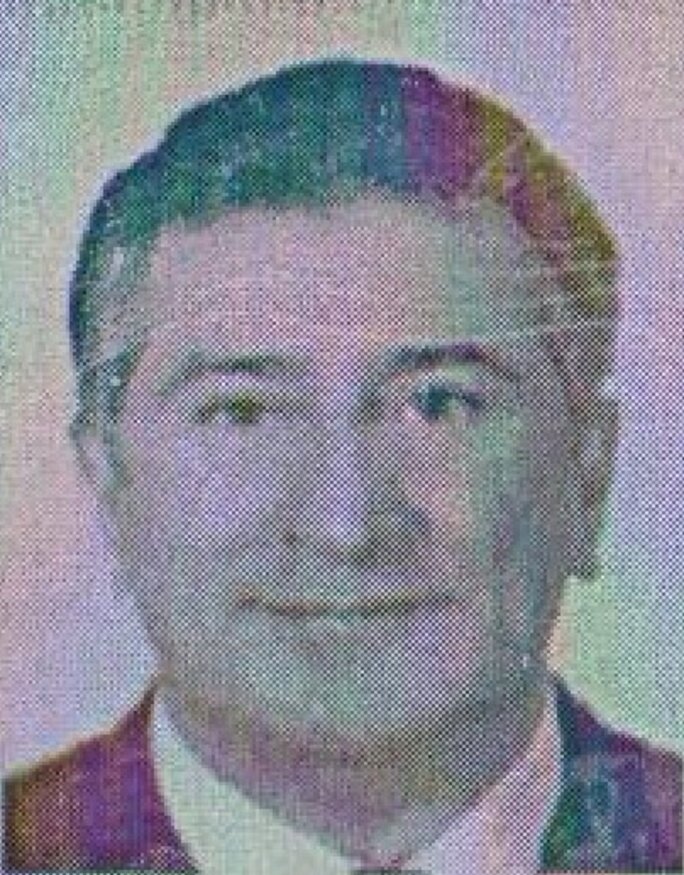
When the dust settled, the Arif family was in a comfortable position. It had gained ownership of the Aktyubinsk Chromium Chemicals Plant, ACCP, one of the world’s biggest producers of chromium-based chemicals, with a payroll of about 5,000. Based in Aktobe, in western Kazakhstan, it is supplied by chrome ore mines in the immediate region, the largest of which is owned by the “Trio”.
The ACCP is the family’s main business activity. Ayla Arif, daughter of Tevfik, wrote to her brother to say that Alexander Mashkevitch “is helping dad keep hold of his primary business”, to which Efendi replied: “He is a great friend for that.”
While there is no evidence that the Arif clan remunerated those close to the ruling regime in Kazakhstan, the documents obtained from Football Leaks illustrate their lack of concern about corruption. They had no qualms when, in 2014, a manager with their construction arm recounted to two family members how he was negotiating a bribe of between “30-40,000 dollars” to help with a property-building project in Kazakhstan.
It was at the end of the 1990s when the three Arif brothers who had remained in Kazakhstan – Refik, Rustem and Vakif – joined Tevfik Arif in Istanbul. They all subsequently gained Turkish nationality and changed their family name from Arifov to Arif.
It was something of a return to their origins: the brothers’ father, born to a Turkish-speaking family in southern Georgia, had been forcibly displaced to Kazakhstan during the mass deportations ordered by Soviet leader Joseph Stalin during World War II. But the move also offered comfort of a less sentimental nature. In 2002, Refik Arif, in his role as the family financier, created a trading company in Istanbul with the sole aim of transferring abroad the vast profits of the ACCP plant in Kazakhstan. In the period between 2004 and 2014, the clan placed 386 million dollars in offshore accounts held by shell companies.
The chemicals produced by ACCP were sold to large European companies that include Procter & Gamble and BASF. To avoid any upset, the invoices were sent out via a company registered in Britain, called Networld, which was a shell company with no employees. The payments it received were then sent on directly to a company registered in the British Virgin Islands, Castello Global, and which itself is controlled by a foundation belonging to the four brothers, called Ravana, based in the tax haven of Curaçao (in the former Netherlands Antilles). One of Castello Global’s subsidiaries, the Maltese-registered company Industry Chemical Holdings, was created especially for business between the ACCP plant and a French company.
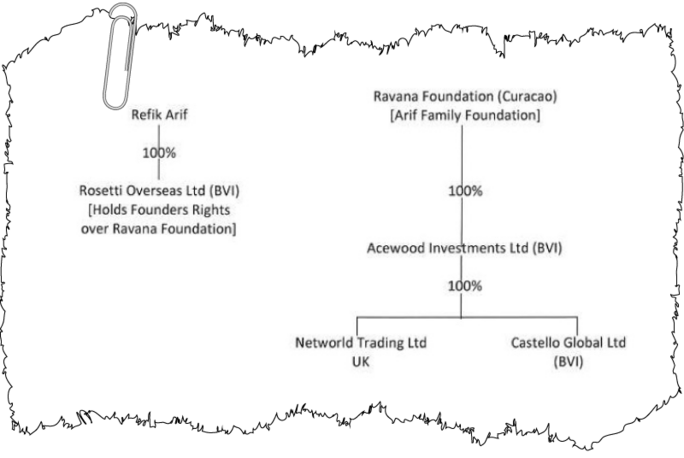
Enlargement : Illustration 4

In 2014, ACCP was one of seven companies chosen by European industrials, notably in the sectors of aerospace, defence and vehicle manufacturing, to lobby the EU for leniency over the use of chromium trioxide in proposed regulations to limit the use of dangerous chemicals, known as the REACH regulation. Chromium trioxide, which is highly toxic and carcinogenic, is used in several key industrial applications involving metal structures, notably for anti-corrosion purposes, and is one of ACCP’s major products.
While Refik Arif ensured the success of the chemicals plant in Kazakhstan, his brother Tevfik Arif also contributed to the family fortune through his business empire in Turkey. He runs the Rixos hotel chain, in partnership with another businessman who serves as a front name. Tefvik also controls a leading Turkish construction company called Sembol, which has a yearly turnover of more than 1 billion euros. Sembol was awarded major construction contracts in Kazakhstan, including the building of Nazarbayev University in the Kazakh capital Astana (named after Kazakh President Nursultan Nazarbayev) and a congress centre which was built on Nazarbayev’s initiative.
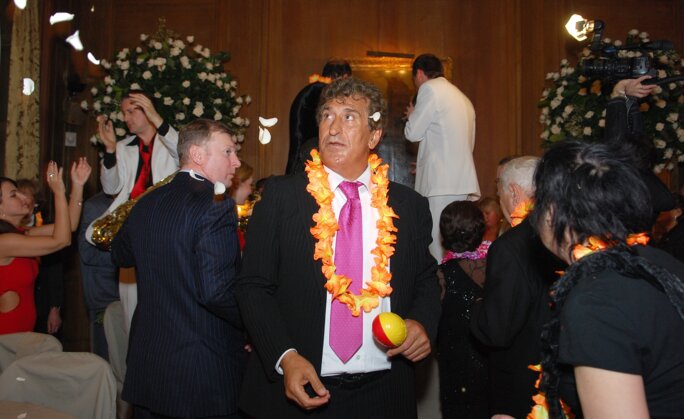
Enlargement : Illustration 5

In the early 2000s, Tevfik settled in the US, where he created a property company, Bayrock Group, which was involved in a longrunning partnership with US president-elect Donald Trump. Bayrock and Trump were the object of several lawsuits over their joint projects (see our report here).
In 2010, Arif was at the centre of a prostitution scandal in Turkey, when he was suspected of having, with others, organised a sex party on a luxury yacht that once belonged to the Turkish republic’s founder and first president, Mustafa Kemal Atatürk. He denied the charges and was eventually acquitted of all of them in 2011, following a controversial investigation.
The yacht, the Savarona, which has remained at the disposition of Turkish presidents since Atatürk’s death in 1938, was at the time leased out to a businessman who in turn rented it out for private clients. Prostitutes were present on at least one of the cruises and Tevfik Arif was charged over his alleged role as a pimp.
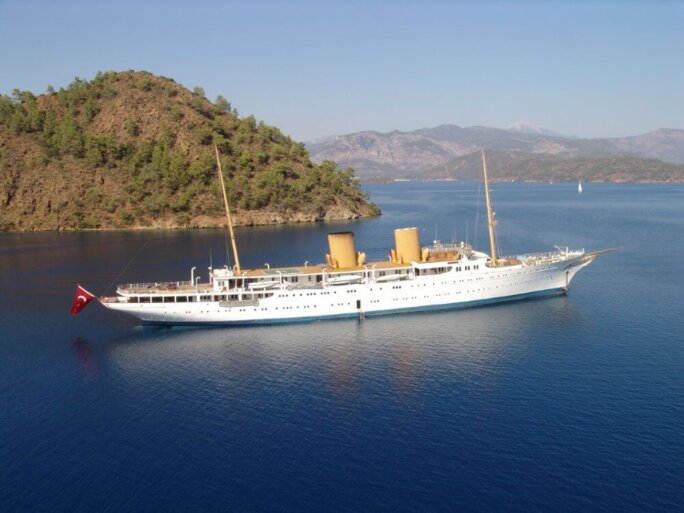
Enlargement : Illustration 6

The case continues to trouble the Arifs, and a lawyer hired to protect the family’s reputation wrote to reassure them that “All documents, other than the judgment are closed”. But the lawyer warned them that journalists could try to retrieve details of the case. Via the Football Leaks documents, the EIC has had access to those details.
The story began on September 28th 2010, when a Turkish military helicopter carrying a group of police officers landed on the deck of the Savarona whle it was moored close to the Mediterranean port of Antalya, in south-west Turkey. Inside the 130-metre yacht a party was going on in the vessel’s many suites. During the police raid, condoms and contraceptive pills were found in the bedrooms, and nine Russian women aged between 18 and 23 were arrested, along with Tefvik Arif, who had organised and paid for their presence on the cruise.
Among the partygoers made up of officials and wealthy businessmen were also the Arifs’ friends, the Kazakh businessmen known as “The Trio”. It was Alexander Mashkevich, one of the three, who had hired the yacht, through the intermediary of an associate of Tevfik Arif, for the eight-day cruise which cost of 309,000 dollars. A former employee of Tevfik Arif told the EIC that “Mashkevitch wanted and organized the party”. According to a Russian press agency, the Kazakh foreign affairs minister, Kanat Saudabayev, was among those present on the cruise. Several sources questioned by the EIC said that members of the political party of Turkey’s then-prime minister, Recep Erdoğan (now president) were also present. Intriguingly, none of these VIPs was arrested nor even questioned during the subsequent investigation.
The raid on the Savarona was the result of an investigation that had lasted several months. From phone taps and physical surveillance it was established that Tevfik Arif, whose underlings called “the boss” during phone conversations, had organised the arrival in Turkey of Russian and Ukranian prostitutes to help with his business dealings. The girls were taken to Rixos hotels, which Tevfik Arif owned, sometimes chauffeured by his personal driver, where they took part in evening parties thrown for Arif’s Turkish and foreign business partners. A Turkish police synthesis report said that one of the aims of the sex parties was “for the purposes of transfer of certain amount of funds, qualification of which could not be determined”.
The phone taps revealed that Tevfik Arif paid and gave orders to the prostitutes, some of who were rejected by him on the grounds that they were not sufficiently pretty. Photographs of the women were published on a website so that his friends could make their choice. Several among the prostitutes were minors, and the cost of their services was increased to 1,500 dollars.
Phone conversations held by one of Tevfik Arif’s helpers were tapped. During one conversation, the man said he had spoken to “the boss” about a 15-year-old girl who “will become 16 on the 20th of the month”. But Arif was made aware by an informant that his phones were tapped, and the use of underage prostitutes was immediately halted. None of the prostitutes arrested on board the Savarona were minors.
Following his arrest, Tevfik Arif denied the accusation that he had been involved in pimping, insisting that the women were models. One of his right-hand men said that he seated them “at the table to decorate it, like flowers”. Meanwhile, a few days after the police raid on the yacht, a woman identified as a woman named “Ilona”, sent a mobile phone text message to the arrested women that read, “Don’t bear any witness - none of you!” But it transpires that none of the women were questioned by the police. Several subsequently submitted written witness statements, via the Russian embassy in Turkey, in which they said sex had never been asked of them.
Tevfik Arif was eventually acquitted of the charges against him, when none of the “models” had corroborated the evidence against him.
A new offshore structure to hide the Arifs' greatest secret
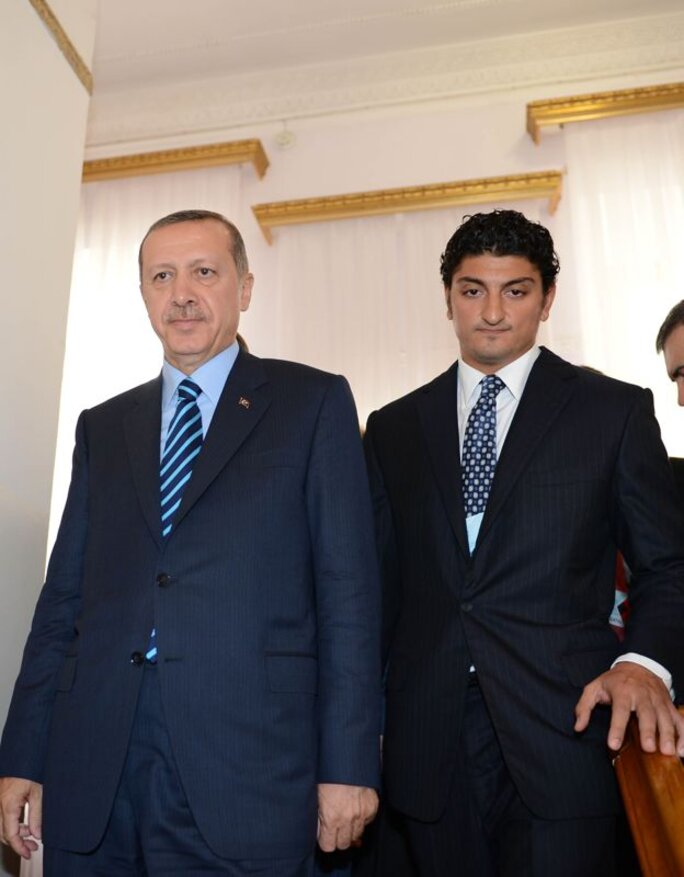
Enlargement : Illustration 7

There is no firm evidence that the clemency shown towards him by both the Turkish police and, subsequently, magistrates was the result of political intervention in the case. But what does appear certain is that the scandal had no detrimental effect on Arif’s excellent relations with Recep Erdoğan. A photo obtained by us (see right) shows Turkey’s strongman posing alongside Tevfik Arif’s son, Arif Efendi When a member of the Qatari royal family mulled an investment operation in Turkey, he called upon Tevfik Arif to arrange a meeting with Erdoğan. In the event, the meeting was not to be “because I was not present” in Ankara, explained Arif, apologetically, to the Qatari.
The Arif family also do business with Sikti Ayan, an entrepreneur close to Erdoğan, and who was alleged in 2014 to have offered the then prime minister’s family a bribe of 10 million dollars. One of Ayan’s companies, Turang Transit Transportation, was awarded a contract to build a pipeline to carry gas from Turkmenistan and Iran to Turkey. The Arif clan was associated in the project, with the benediction of Erdoğan who signed a contract for the related deal with the Iranians despite a US embargo. “This is a deal of a lifetime for us and my father’s top priority,” wrote Tevfik Arif’s son, Arif Efendi, about the pipeline project in July 2013.
To help the project, Arif Efendi gave Nelio Lucas, his Doyen Sports director, an important mission: “We are on the verge of something big in Turkmenistan,” he wrote. “[...] We need to bring either Real Madrid or Barca there to play an exhibition match to impress the president. There are billions to be made there. I need you to take this very serious and start planning asap please.” To which Lucas replied: “President of Real is in London today. I fly with him to Madrid. […] It’s simple : 3 million euros minimum, and they need to have a date.”But in the end, for reasons that are unclear, the match never took place.
Back in 2010, the Arif family decided to re-invest the vast wealth it earned from its chemical factory and which was hidden in offshore companies controlled by Refik Arif. They began by creating a family office in London, called Doyen Capital. In what would appear to be his apprenticeship in the world of business, Tevfik Arif’s son Arif Efendi was given the task of running the company.
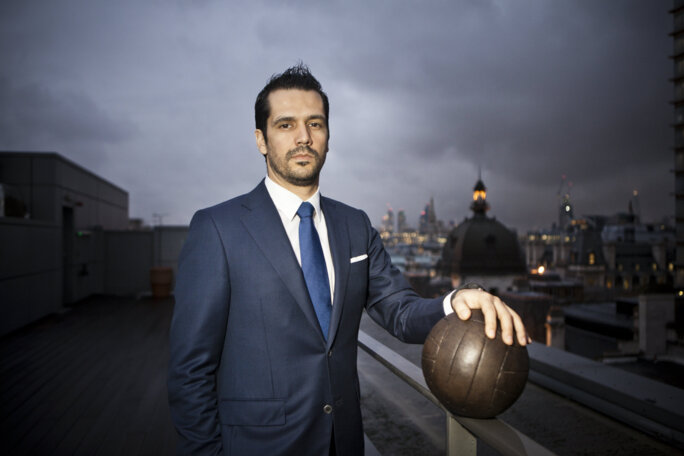
Enlargement : Illustration 8

But Doyen was only a company nameplate, created to impress the group’s partners. The London office owned nothing and had about 30 staff at most, whose job was to trade in raw materials and find new investment opportunities. The family soon realized that football was a profitable business with little to envy in the chemicals or coal trade. Which is why Doyen Sports Investments was created in 2011, placed within the same offices as Doyen Capital, and run by Nelio Lucas (see our investigation into the practices of Doyen Sports here).
Given the media spotlight on football, the Arifs decided to move cautiously. Doyen Sports was registered in Malta. Lucas was given a 20% stake in the business, via a frontman. The rest belonged to an offshore company run by a nephew of the brothers, who served as nominee for the family. The real owner of Doyen Sports is Refik Arif, who loaned all of its initial 74.6 million euros of capital, for which he receives interest payments. Meanwhile, because he is not a shareholder, his name appears nowhere in connection with the company.
Arif Efendi, as head of Doyen Capital, instructed his PR advisors that Nelio Lucas must be the “only face of Doyen brand”. While he and Lucas managed the day-to-day affairs of Doyen Sports, they were in reality simply employees of Refik and Tevfik Arif, with a mission to make money.“All our jobs depend on me managing the relationship with my father and my uncle,” wrote Arif Efendi in an email to Lucas, complaining of the brothers: “I’ve been getting my head fucked everyday.”
In January 2015, Nelio Lucas showed signs of eyeing a move. The practice of Third Party Ownership (TPO), whereby an individual or a company can buy a percentage of a football player’s economic rights, for which the investor receives a proportionate part of a player’s future transfer fee, was to be banned that spring by the world football governing body Fifa. TPO was the essential moneymaker for Doyen Sports and Lucas attempted to convince the Arifs to sell the company, but they refused the idea. For, despite the Fifa TPO ban, selling their share of players would bring them 30 million euros. Lucas briefly thought of resigning but eventually settled back down in his job. Six months later he received a sharp and humiliating letter from Refik Arif ordering him to bring in money for the company – and rapidly.
Back in November 2013, just several months after the Bloomberg report published the name of Tevfik Arif, the family decided to close its London office, Doyen Capital, until then the European representation of the brothers’ business activities. The website was closed and staff were relocated to Dubai, a discreet environment with lenient taxation. Doyen Sports remained operating out of the emptied office space in London, and Nelio Lucas was concerned to know whether that would soon change.
But Refik Arif had a much bigger problem on his hands. The offshore structure through which transited the profits from the ACCP chemical plant in Kazakhstan was under threat. His financial advisor wrote to him to warn that with the hardening of international anti-moneylaundering operations, banks “are becoming increasingly averse to use of tax haven companies”, and one of the Arifs’ accounts had been suddenly shut down. If the multinational clients of ACCP were to discover that they in fact buy from an entity in the British Virgin Islands, the consequences could be dramatic.
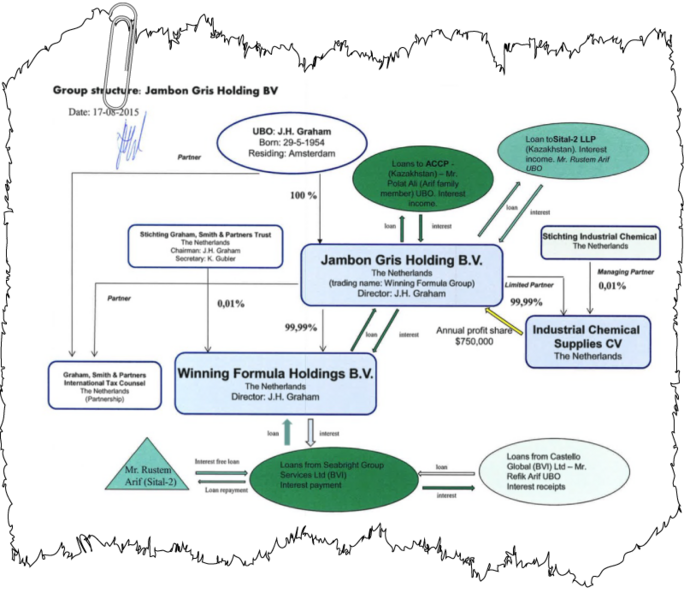
Enlargement : Illustration 9

A solution needed to be found urgently, and it was found in the Netherlands, a European country above all suspicion. In the new structure of companies and accounts, beginning in the Netherlands and ending up offshore, the chemicals plant was owned by a maze of companies registered in Amsterdam and run by frontmen while the Arif brothers were safely hidden behind them.
They had locked down their biggest secret, that of ACCP, the offshore route of its millions of euros in profits, and the family’s mysterious protectors who, according to Arif Efendi, were capable of ruining the family’s business overnight. For the Arif’s, no-one should know that it is those funds that irrigate the activities of Doyen Sports.
-------------------------
- This article in English is based on Mediapart's original report in French, which can be found here.


